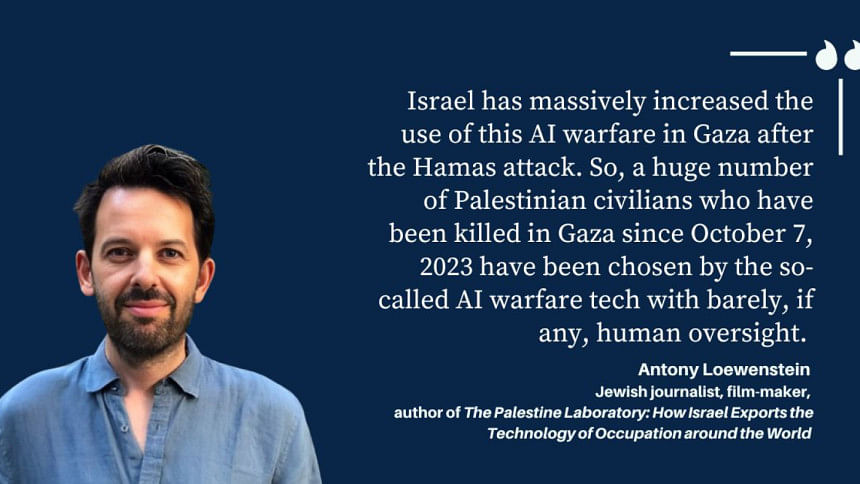‘Israel's main mission is not combating terrorism, but destroying Gaza’

As the genocide in Gaza continues, Antony Loewenstein, an independent journalist, film-maker, and best-selling author of The Palestine Laboratory: How Israel Exports the Technology of Occupation around the World, speaks to Priyam Paul of The Daily Star debunking how Israel's surveillance technology, the military-industrial complex, and global dynamics perpetuate the suffering of Palestinians.
What experiences shaped your interest in writing your book?
I am a Jewish Australian-German. I was born in Melbourne, Australia in 1974, and brought up in a relatively liberal Jewish home. However, believing and supporting Israel was pretty much a part of the regular, daily discourse. It was not rammed down my throat, but it was pretty standard for many Jewish people to support Israel, because of our own history. For instance, my own family came from Germany and Austria. Majority of my family members were killed in the Holocaust; the ones who escaped, mostly in 1939, were spread around the world, including Australia. Therefore, the idea of a so-called safe-haven for Jews—as we were told—was Israel, which made sense to me when I was a child.
Of course, what I was not told while growing up was that there were millions of Palestinians who have been under occupation for decades, and they are suffering because of that safe haven and supposed Jewish liberation. When I discovered the truth myself, it really made me deeply uncomfortable since I was a teenager and it continues to unnerve me to this day.
Why and how have the military-industrial complexes of both Israel and the US become so deeply intertwined, and in what ways have they operated similarly over the years, particularly to perpetuate the occupation and systemic erasure of the Palestinian people?
The US is Israel's biggest funder, armour, political supporter, diplomatic backer, and ally. This has been the reality since 1948, when Israel was established. It massively accelerated after 1967 when Israel took control of the West Bank, Gaza, and East Jerusalem, and it has been the case long before Donald Trump became president again earlier this year.
Huge amounts of weapons that Israel uses are often tested and trialled in the US first. When the US is giving billions of dollars of so-called aid and military support every year to Israel, a significant amount of that money goes to certain districts in the US to back specific weapons or defence programmes. It is also worth mentioning that although the US-Israel relationship is very close, it is dysfunctional. Both nations massively spy on each other. We are not aware of the exact number of spies that both nations use on the other, but there is a desire on both sides to get the most accurate insider information about each other. So, the two nations are supposedly best of friends, but they also don't completely trust each other.
In your book, you wrote, "Israeli history can be split into two eras: before and after 1967." Could you elaborate on the implications of the Six Day War for Israeli policy and explain what led to such a drastic historical and political shift?
After 1967, Israel took control of the West Bank, Gaza, East Jerusalem, and the Golan Heights, and there was a perceived need within Israel to justify and defend those military actions and what became a brutal military occupation against the occupied Palestinians who lived there. Although Israel, for years before 1967, had used Palestine as a laboratory, it massively expanded after that. From the late 1960s, but certainly into the 1970s and pretty much to this day, roughly 50 or so years later, Israel often uses the occupied Palestinian territories as a way to prove to other countries how effective they are at suppressing Palestinian dissent or their self-determination.
A large number of other countries, military figures, police forces from the US, along with parts of Europe and Asia, often travel to Israel to observe firsthand the reality of what the occupation means for Palestinians and then take back that experience and knowledge, often to develop defence relationships and contracts relevant to their own conflicts. The previous repressive administration in Bangladesh also sought Israeli tech to spy on dissidents of the state.
To what extent has the world changed with Israel's global reach in surveillance—through arms sales, mobile tracking technologies, and its influence over social media platforms where Palestinian content is often censored?
Israeli technology has massively influenced surveillance around the world, although there are obviously other countries that produce surveillance technology, including the US, China, and many countries in Europe. Israel is a global leader in surveillance technology and possibly among the top one or two biggest providers of surveillance worldwide.
The most prominent of these technologies often comes from the software company NSO Group and its tool, Pegasus. However, there are others, such as Paragon. They are sold to various governments, dictatorships, democracies, police forces, and intelligence services.
We are told that they are used to fight "terrorism and crime," but actually they are often used by those states with clearly the knowledge of both NSO Group and the Israeli government, to go after dissidents, critics, and human rights activists. And one of the ways that Israel—particularly since Benjamin Netanyahu became prime minister many years ago—has been using these weapons and surveillance technologies is as a diplomatic tool.
It is a way for Israel to make so-called friends. Israel says to a country, that we will sell this incredibly powerful spyware that will enable you to monitor your dissidents and people you don't like, but in return, we would like you to do certain things for us. For example, voting in a certain way in the United Nations or supporting Israel in some other way.
How do you evaluate the events of the Hamas-led attack on Israel on October 7, 2023, and Israel's ongoing large-scale assault on Gaza?
The Hamas attack on Israel on October 7, 2023, in many ways, should have revealed to the world that Israel's surveillance and military tech has failed miserably. From the Israeli perspective, more than 1,200 Israelis were killed and all their defences disappeared. Hamas was able to overwhelm Israel's defences.
However, the reality is that many of the same companies that had been used by Israel before October 7, 2023 to provide apparent defence to Israel from Gaza and Hamas are now some of the key players in Israel's genocide in Gaza. I am talking about Elbert, Israel's biggest defence company, and others. They are using, leveraging, and testing massive amounts of weapons in Gaza. One of the most prominent examples of this testing includes killer drones, so-called quadcopters, artificial intelligence (AI), which did exist and was used before October 7 as well.
However, Israel has massively increased the use of this AI warfare in Gaza after the Hamas attack. So, a huge number of Palestinian civilians who have been killed in Gaza since October 7, 2023 have been chosen by the so-called AI warfare tech with barely, if any, human oversight. This is because Israel's main mission in Gaza has never been about destroying Hamas or going after terrorism. Rather, it has been about destroying Gaza and making it unliveable.
What role can the global public opinion play in addressing the long-term Palestinian cause, especially when international pressure often fails to bring about meaningful change?
The two-state solution for Israel and Palestine is over and dead, and arguably was never going to happen. Because for decades, the Israeli politicians—and I would say many, if not most, of the Israeli Jewish public—have shown little interest in giving up the occupied territories that they control. The Israeli settler movement, which is not the majority of the Israeli public but certainly the most politically powerful, has essentially taken over the state. There is no political pressure within Israel for a two-state solution, and there is frankly no international pressure either.
The US, even before Donald Trump, essentially was allowing and supporting Israeli actions in the West Bank, Gaza, and beyond. The Europeans are mostly distracted with their own issues, with Ukraine and now Trump. The Arab countries talk about a two-state solution, but they are mostly keen on maintaining good relations outrageously and shamefully with Israel and the US. So, what I fear is that, in the short to medium terms, we are going to see what kind of already exists, which is a one-state apartheid system, where Israelis have full rights, while Palestinians remain second class citizens.
Antony Loewenstein's book The Palestine Laboratory: How Israel Exports the Technology of Occupation around the World is set to be translated into Bangla and re-published soon.
Views expressed in this article are the author's own.
Follow The Daily Star Opinion on Facebook for the latest opinions, commentaries and analyses by experts and professionals. To contribute your article or letter to The Daily Star Opinion, see our guidelines for submission.

 For all latest news, follow The Daily Star's Google News channel.
For all latest news, follow The Daily Star's Google News channel. 



Comments